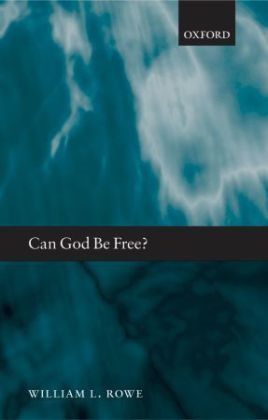Read more
Zusatztext Rowe writes in a clear, accessible style on important topics. Klappentext Can God Be Free? is a penetrating study of a central problem in philosophy of religion: can it be right to regard God as free and as praiseworthy for being perfectly good? Allowing that he has perfect knowledge and perfect goodness! if there is a best world for God to create he would have no choice other than to create it. But if God could not do otherwise than create the best world! he created the world of necessity! not freely! and we have no reason to be thankful to God for creating us! since he couldn't do otherwise. William Rowe proposes the need for some substantial revision in contemporary thinking about the nature of God. Zusammenfassung In the three major religions of the West, God is understood to be a being whose goodness, knowledge, and power are such that it is impossible for any being, including God himself, to have a greater degree of goodness, knowledge, and power. This book focuses on God's freedom and praiseworthiness in relation to his perfect goodness. Given his necessary perfections, if there is a best world for God to create he would have no choice other than to create it. For, as Leibniz tells us, 'to do less good than one could is to be lacking in wisdom or in goodness'. But if God could not do otherwise than create the best world, he created the world of necessity, not freely. And, if that is so, it may be argued that we have no reason to be thankful to God for creating us, since, as parts of the best possible world, God was simply unable to do anything other than create us---he created us of necessity, not freely. Moreover, we are confronted with the difficulty of having to believe that this world, with its Holocaust, and innumerable other evils, is the best that an infinitely powerful, infinitely good being could do in creating a world. Neither of these conclusions, taken by itself, seems at all plausible. Yet each conclusion appears to follow from the conception of God now dominant in the great religions of the West. William Rowe presents a detailed study of this important problem, both historically in the writings of Gottfried Leibniz, Samuel Clarke, Thomas Aquinas, and Jonathan Edwards, and in the contemporary philosophical literature devoted to the issue. Rowe argues that this problem is more serious than is commonly thought and may require some significant revision in contemporary thinking about the nature of God. Inhaltsverzeichnis 1: Leibniz on Divine Perfection and Freedom 2: Clarke on Divine Perfection and Freedom 3: Aquinas on the Infinity of Worlds 4: Jonathan Edwards on Divine and Human Freedom 5: Must God create the best world? 6: Divine Perfection and Freedom: The Contemporary Debate 7: Can God be the cause of his own nature? ...

